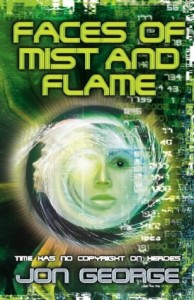 Phoenix Lafayette is a combat correspondent following the exploits of a group of Marines during World War II, starting with their days in boot camp, all the way up to now, as they slog through the jungles of 1941 Guam, fighting “the Enemy” for every inch, every step of territory. He’ll make sure the people back home know and appreciate exactly what’s happening out there in the middle of nowhere, turn these boys into heroes and martyrs, and open their eyes to the grim realities of war. But he secretly fears that the stress of war is driving him mad. Why else would he be hearing a soft female voice in his head?
Phoenix Lafayette is a combat correspondent following the exploits of a group of Marines during World War II, starting with their days in boot camp, all the way up to now, as they slog through the jungles of 1941 Guam, fighting “the Enemy” for every inch, every step of territory. He’ll make sure the people back home know and appreciate exactly what’s happening out there in the middle of nowhere, turn these boys into heroes and martyrs, and open their eyes to the grim realities of war. But he secretly fears that the stress of war is driving him mad. Why else would he be hearing a soft female voice in his head?
Over six decades later, Serena Freeman is one of the most intelligent people in the world, a former child prodigy turned grown-up scientific genius. Her latest invention is a time machine of sorts, one which allows the user to inhabit the mind of anyone in the past, sharing their thoughts, feelings, and sensations. This miraculous device unites the two people over the vast gulf of time, joining them in a bizarre bond of shared experiences and common goals.
For whatever reason, they share the same delusion: that “Nix” will only survive the horrors of war by emulating the mythical twelve labors of Hercules, finding modern variations on the ancient tasks. Concurrently in the future, Serena too must find symbolic ways to complete the tasks, strengthening the sympathetic bond between them. What she doesn’t know, caught up in her obsession with aiding and sharing Nix’s experiences, is that a secret faction of the government wants her new invention, and is willing to kill for it.
Told over three distinct periods of time: Ancient Greece, 1941 Guam, and modern-day Cambridge, Faces of Mist and Flame is a fascinating, multi-layered story, with its various threads weaving through and around one another, reinforcing the core themes and causing the shared experiences to resonate through the decades. Nix and Serena’s labors are interspersed with retellings of Hercules’ original tasks, against a backdrop of violent battles and bloody tragedy. Over time, the story takes on an almost hallucinatory quality as the differences between time zones become blurred, and Serena spends more and more time focused on Nix’s progress. Her concern for her own safety falls by the wayside as she tries to keep Nix alive, and Nix’s own sense of self-preservation erodes as the constant carnage and violence eats at his self-control and humanity. Together, they might save one another, or damn one another.
Jon George really captures the insanity, violence, and sudden brutality of war, in the same way Saving Private Ryan did. It’s a setting where anyone can die for no particular reason at any given time, which gives rise to a rather morbid game of chance held between the Marines of Nix’s unit: Dead Pool Poker. Each man throws money into the pot and receives a hand of cards. They keep that hand until they die, at which point someone can retrieve the cards, make a better hand for themselves, and destroy the unwanted cards. Last man standing with the best hand wins the pot. A fascinating, if extremely morbid concept, to say the least, but the game, as it’s played out over the course of the book, is just another perfect touch to an already disturbing story.
Once I started reading Faces of Mist and Flame, I couldn’t stop. I was caught up in its multiple threads and layered storyline, eager to see how Nix would complete his tasks, and how Serena would help him in her own strange way. I was less concerned with the government plot to steal Serena’s invention; that didn’t seem nearly as important in the grand scheme of things. For me, the big story was the relationship between Nix and Serena, and Nix’s personal journey.
This book won’t be for everyone: it’s violent, brutal, somewhat surreal and experimental, but it’s still a damn good read with a great twist on the old time travel subgenre. Do be aware that it’s a British release, not likely to be seen in the U.S. for some time, and so American readers may need to check somewhere like Amazon UK for it. This is certainly a very promising debut novel for Jon George, and I look forward to seeing what he does next.
Originally posted on SF Site, 2004
